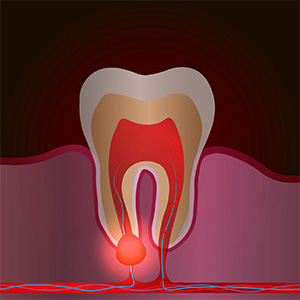
Root Canal Therapy – Belmont, NH
Relieve Your Pain and Save a Suffering Tooth

With today’s modern dental techniques, root canal therapy no longer has to be a scary or painful procedure. In fact, this treatment is designed to relieve pain, not cause it! Both Our dentists have vast experience performing root canal therapy in our Belmont, NH dental office. They do so with gentleness and precision — and sedation is available to help you relax. Following your procedure, you can expect to get back to feeling like yourself in practically no time at all.
Why Choose The Center for Contemporary Dentistry for Root Canal Therapy?
- Experienced dental team
- Sedation available
- Save an infected tooth from extraction
Do I Need Root Canal Therapy?

Root canal therapy is necessary when the pulp, the innermost layer of a tooth, suffers infection or damage. This can happen due to decay or physical trauma. Keep in mind that in some cases, a dentist in Belmont might recommend root canal therapy even if you are not experiencing any pain. Often, though, patients notice the following prior to their procedure:
- A throbbing, severe toothache
- A tooth that is darker in color than the ones around it
- A pimple-like bump on the gums
- A tooth is extremely sensitive to hot and cold stimuli
- A tooth is extremely sensitive to any sort of pressure
- There is visible damage to a tooth
The Root Canal Process

First, we will do all we can to make you comfortable. For example, we will use local anesthesia to numb the area of your mouth where we will be working. If you are nervous about the procedure, or if it is difficult for you to get numb, we may recommend that you be sedated as well.
Once we get started on your procedure, we will access your tooth’s interior and carefully clean out all the damaged and infected tissue. We will also remove the tooth’s nerve. Next, we will fill in the tooth with a special material known as gutta-percha. Following root canal therapy, you will likely need a crown to protect your treated tooth and make sure it is as strong as possible.
The Benefits of Getting a Root Canal

- It can relieve pain. Contrary to its notorious reputation, root canal therapy is more likely to relieve pain than cause it.
- It can preserve a damaged tooth. Often, this procedure can prevent the need for an extraction, which can allow you to avoid spending money on tooth replacement down the road.
- The results last a long time. It is common for a root canal-treated tooth to last for a lifetime.
- Caring for your treated tooth is easy. By keeping up with good oral hygiene and regularly visiting your dentist, you can greatly reduce the risk of damage to both your dental crown and the tooth beneath it.
Understanding the Cost of Root Canals

The cost of a root canal in Belmont tends to vary from patient to patient. During your consultation, we will be able to provide you with a personalized price estimate. In the meantime, we invite you to read the information below in order to gain some insight into the financial aspect of this procedure.
Factors That Can Affect Root Canal Cost

A few factors that can affect the cost of root canal therapy include:
- The type and location of the tooth. It is typically easier and quicker to treat teeth toward the front of the month. Molars are more complex and may incur higher root canal fees.
- The complexity of the case. We can handle most root canal treatments right here in our office. However, in rare cases, we refer patients to a specialist. Specialists may charge more for their services.
- Additional services. You will likely need a crown after your root canal treatment. Naturally, this will add to the overall cost of your care.
Is It Cheaper to Pull My Tooth?

Upfront, a tooth extraction costs less than root canal therapy. For that reason, some patients are tempted to simply get an infected tooth removed. However, it is important to consider long-term costs. If you get a tooth extracted, you should get it replaced with a bridge or implant in order to prevent future problems, such as dental drift and additional tooth loss. Tooth replacement can be quite pricey.
It is often more affordable in the long run to get a root canal. It is usually a “one and done” procedure that can provide you with many years of reliable function from your treated tooth.
Does Dental Insurance Cover Root Canals?

In most cases, yes, dental insurance does cover root canal therapy. It may be classed as a major or minor service, meaning that anywhere from 40% to 80% of its price might be covered, up to the amount of your plan’s annual maximum. Our team members are pros at dealing with insurance, and we accept virtually all major policies. We will help you confirm your coverage, file your claims, and maximize your benefits.
Other Options for Making Root Canal Therapy Affordable

As your emergency dentist in Belmont, we do not want you to worry too much about the financial aspect of your care. That is why, in addition to assisting you with insurance, we offer some budget-friendly provisions:
- Most patients are eligible for low- or no-interest financing through CareCredit. The application process is fast, and you may be able to choose a monthly payment amount that fits your family’s budget.
- Essential Dental Plan. This discount plan provides reduced fees on virtually all the services we offer. Signing up for it is quick and easy!
Do you want to learn more about root canal therapy and its cost? Contact us today to schedule a consultation. We look forward to helping you enjoy a healthier smile.
Root Canal FAQs

Root canal therapy has the potential to save a damaged tooth and end a debilitating toothache. However, it is understandable if you want to gather as much information about this procedure as possible before you commit to it. To assist you, we have put together the following list of FAQs about root canals. If you do not see the answers to your specific questions, please reach out to us directly.
How Long Does It Take to Recover from a Root Canal?
People heal at varying rates, so if you are taking a bit longer to bounce back from your procedure than you expected, there is probably no reason to worry. With that being said, most patients are able to go back to work or school the day after their appointment. If you have a job that requires a lot of physical activity, you may need to take extra time off because exercise may slow down your body’s ability to heal.
You can expect your mouth to be sore for several days. However, by following post-treatment instructions as closely as possible, you can minimize your discomfort. For example, you should eat soft foods, take pain medication as necessary, and call our practice if you experience any unusual symptoms.
What Should I Do Before a Root Canal?
Some practical steps you can take before a root canal include:
- Eating a nutritious meal. You may not feel like eating after your appointment, so filling up beforehand is a wise idea. (If you will be sedated, though, you might be required to fast for several hours prior to your appointment.)
- Taking an over-the-counter pain reliever. This may mitigate post-treatment discomfort.
- Getting a full night of rest. Being well-rested can support your body’s immune system and reduce any stress that you may feel around your appointment.
How Long Do Root Canals Last?
Ideally, the results of your root canal should last for a lifetime. In fact, most patients go on to enjoy several decades of pain-free, reliable function from their treated tooth. The crown on your treated tooth may need to be replaced every 10 years or so.
Of course, how well your results hold up will depend largely on how you care for your mouth. Diligent oral hygiene, routine dental checkups, and other practical steps will reduce the risk that your treated tooth will incur a new infection.
What Happens If You Wait Too Long for a Root Canal?
Teeth are incapable of healing themselves. Therefore, an infection is likely to get worse the longer you go without receiving treatment. It might progress to the point where root canal therapy is no longer an option; you might have to get the tooth extracted instead. There is also the possibility that the infection will spread into nearby tissues. In rare cases, an untreated tooth infection can cause life-threatening complications.
It is generally best to promptly schedule any treatment that your dentist recommends.